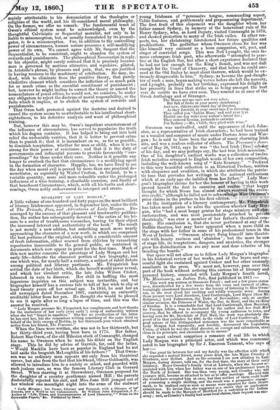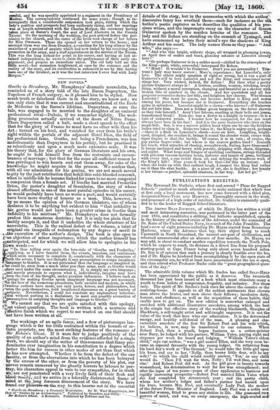BIOGRAPHY OF LADY MORGAN.'
A little volume of one hundred and forty pages onIthe most brilliant of literary Irishwomen appeared, in September last, under the title of 27e Friends, Foes, and Adventures of Lady Morgan. En- couraged by the success of that 'pleasant and trustworthy publica- tion, the author has subsequently devoted "the entire of his lei- sure to a series of troublesome researches, having for their object the increased interest and authenticity of the book." The result is ,not merely a new edition, but something much more nearly approaching the character of a new work, in which are comprised the best portions of the original, along with a considerable amount of fresh information, either rescued from oblivion by ransacking repositories inaccessible to the general public or contained in documents which now appear in print for the first time. Much of this new matter concerns the parentage of Lady Morgan and her early life—hitherto the obscurest portion of her biography, and one which was, for nearly half a century, a subject of rabid debate among political and literary partisans. Mr. Fitzpatrick has settled the date of her birth, which she herself would never reveal, and which her virulent critic, the late John Wilson Croker, laboured in vain to discover. Her skill in baffling the most ingenious inquiries on this subject was invincible, and her biographer himself has a curious tale to tell of her wish to clip at least twenty years off her actual age. In 1855, he sent her an old newspaper dated December 1807, containing an eminently creditable letter from her pen. He thought she would be pleased to see it again after so long a lapse of time, and this was the answer he received.
"Lady Morgan presents Mr. Fitzpatrick her compliments and best thanks for the enclosures of her early (very early !) scrap of authorship written when she but "lisped in numbers." She has no recollection of the letter he has sent her, but she remembers writing something of the same kind on behalf of the little sweeps of Dublin, in her thirteenth year which obtained notice from her friend, The Freeman."
When the lines were written, she was not in her thirteenth, but her thirty-third year, having been born in 1775. Her father, Robert Mac Owen, of the old Milesian stock of Connaught, changed his name to Owenson when he made his debfit on the English Stage. This he did by advice of Garrick, for, said the latter, "Would Macklin have been as popular in England had he not laid aside the broguish McLoughlin of his fathers ?" That Owen- son was no ordinary man appears mat only from his theatrical career, but also from the fact that his friend, Oliver Goldsmith, was allowed to introduce him to a society so select, and guarded with such jealous care as was the famous Literary Club in Gerrard Street. When starring it at Shrewsbury, Owenson proposed for the daughter of a country gentleman named Hill ; the parents disdainfully rejected his snit, and Miss Jane Hill jumped out of her window one moonlight night into the arms of the stalwart
• Lady Morgan ; her Caner, Literary and Personal with a Glimpse of he Friends, and a wont to her Calumniators. By William John Fitzpatrick,' . Author of " Life, Times, and Contemporaries of Lord Cloneurry," " Notes on the Cornwallis Papers," Sm. Published by Sheet.
young Irishman of "persuasive tongue, commanding aspect, Celtic features, and Fentlemanly and prepossessing deportment." The first fruit of this elopement was the daughter whom her father named Sydney, in memory of the benevolent rule of Sir Henry Sydney, who, as Lord Deputy, visited Connaught in 1576, and showed protection to many of the Irish exiles. In other res- pects, too her christening foretokened her future qualities and predilections. The godfather whom Owenson chose for her was like himself very eminent as a boon companion, wit, poet, and singer of convivial songs. This was Ned Lysaght, the once fa- mous extempore Irish poet, who afterwards attempted to prac- tice at the English Bar, but after a short experience declared that he had not law enough for the King's Bench, and was not dull enough for the Court of Chancery, and that before he could suc- ceed at the Old Bailey he must shoot Garrow, which would be ex- tremely disagreeable to him." Sydney, as became the god-daugh- ter of such a man, began making verses before she left the nursery, and Lysaght, probably on her birthday, expressed his delight on her precocity in lines that strike us as being amongst the best vers de societa we have ever seen. They remind us at once of the Greek Anthology and of Bertmger.
The Muses met me once not very sober, But full of frolic at your merry christening! And now, this twenty-third day of October, As they foretold, to your sweet lays I'm listening. They called you 'Infant Muse,' and said your lyre Should one day wake your nation's latent fire ; They ordered Genius, garlands to entwine For Sydney ;—Me, rfaith, they plied with wine."
Owenson was unrivalled, until the appearance of Jack John- ston, as a representative of Irish characters ; he had been trained as a vocalist and composer of music under Doctors Arne and Wor- gan ; he is said to have been the author of many charming Irish airs, and was a zealous collector of others. The Freeman's Jour- nal of May 28, 1812, says he was "the best Irish [Erse] scholar of his day, and we may perhaps say, the last true Irish musician." One of his daughter's earliest works was a collection of twelve Irish melodies arranged to English words of her own composition • including the well-known song of "Kate Kearney." "Prefixed to this very beautiful collection is an Historical Preface, written with eloquence and erudition, in which she attributes the patrio- tic tone that pervades her writings to the national enthusiasm which at an early age she imbibed from her father." Lady Mor- gan's biographer claims for her the honour of having in this work proved herself the first to conceive and realise that happy thought for which Moore has almost always received the exclu- sive credit," although he failed not to acknowledge Miss Owenson's prior claims in the preface to his first edition.
At the instigation of a literary contemporary, Mr. Fitzpatrick has taken much pains to solve the question whether Lady Mor- gan, who "had a most happy genius for stage mimicry and cha- racterization, and was most passionately attached to private theatricals," was ever a member of her father's theatrical com- pany-. His conclusion is, that she never performed at any of the Dublin theatres, but may have appeared when a mere child on the stage with her father in some of his professional tours in the West of Ireland. "Owenson always flung himself into theatri- cals with hearty raciness and abandon ' ; but the more he saw of stage life, its temptations, dangers, and anxieties, the stronger grew his disinclination to see any near and dear relative of hit treading the boards." Our space will not allow us to follow Lady Morgan's biographer in his historical review of her works, and of the brave and suc- cessful fight she sustained against Croker and her other unmanfy- assailants in the press. We must not, however, pass over part of the book without noticing this curious bit of literary and: personal history, connected with Lady Morgan's fourth novel,
The Missionary, an Indian Tale, first published in 1811 :— 1, " This work was written at Stanmore Priory ; and not a few grave states- men, disenthralled for a few weeks from the cares and turmoil of office, loungingly abandoned themselves to the luxury of listening to Miss Owen: son, as she read aloud her exciting and wildly romantic story. Among those present were Lord Aberdeen, Lord Castlereagh, Lord Ripon (then Mr: Robinson,) Lord Palmerston, the Duke of Devonshire; and, on another similar occasion, the Princess of Wales, the Due de Berri, and the ex-King' of Sweden. It is a remarkable fact that Lord Castlereagh, then Secretary for Foreign Affairs, was so fascinated by the author and her frail Ilia" sionary, that he offered to accompany the young authoress to town, and having sent for Mr. Stockdale of Pall Mall, the work was absolutely dis- posed of to that publisher for 400/. in the study of Lord Castlereagh. The pod nature of this distinguished statesman was the more remarkable as Lady Morgan had repeatedly, and forcibly, denounced the Legislativa Union, of which he was the chief director, as corrupt and calamitous, atr0 cious in its principle, and abominable in its means." Our next extract comprises a romance of real life in whicliy Lady Morgan was a principal actor, and which was communik, cated to her biographer by Sir J. Emerson Tennent, who says of
her :—
" One great tie between her and my family was the affection with which she regarded a mutual friend, many years dead the late Major Crossley of Glenburn, near Belfast. And on the occasion I am now alluding to, Lady Morgan, during dinner, told me, for the first time, the story of their early intimacy. Major Croesley's family lived at Lisburn, when she became ac- quainted with him when her father was on one of his professional tours in the North of Ireland. She was then very young and Crossley who vr.aa younger still, became so attached to her as to offer marriage. She told hire she would have accepted him at once, but that neither of them• could boort of possessing a single shilling and the result was a prospective. engage- ment, to be realized only's, soon as means were apparent for their future subsistence. To devise this, she suggested as a career that an applicfplin should be made to the Marquis of Hertford for a cadetship In t htewL dia army ; and, as Crossley's family had some local claims, their reques in
earful, and he was speedily appointed to a regiment in the Presidency of Madras. The correspondence continued for some years ; though se in- terruptedly that a considerable suspension took place, during which the lady's position and prospects had been uniformly rising, and her marriage was at length solemnized with Sir Charles Morgan, the ceremony having taken place at Baron's Court, the seat of Lord Abercorn in the County Tyrone. On the morning of the wedding, the post arrived before the pro- cession to the church and the sister of the bride took charge of her letters for Miss Owenson. These she opened on her return to the house ; and amongst them was one from Crossley, accounting for his long silence by the anxieties of a period of anxiety which had now ended by his receiving some promotion in the army, and a staff appointment in the service of the Nizam. This was the long looked-for point in his career, and having at last at- tained independence, he wrote to claim the performance of their early en- gagement, and propose an immediate union. The old lady told me this little novel—her animation heightened, at once by the romance and the reality of the story, and its recollection is enhanced to me by this having been one of the liveliest, as it was the last interview lever had with Lady Morgan."



























 Previous page
Previous page